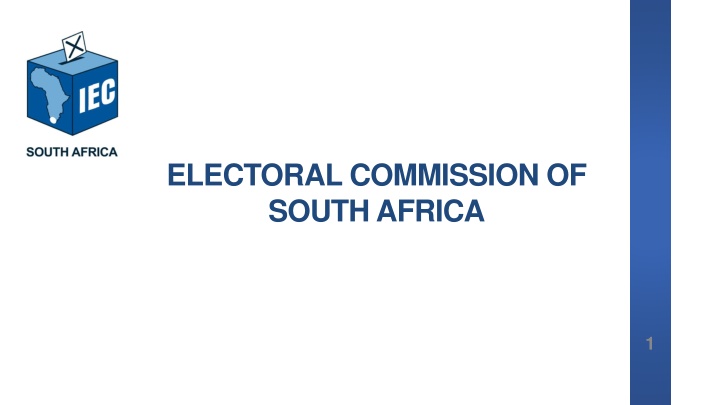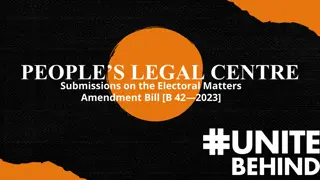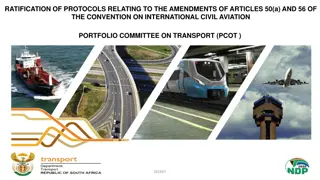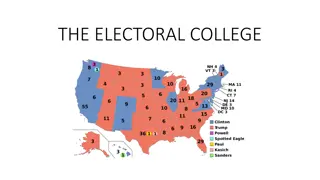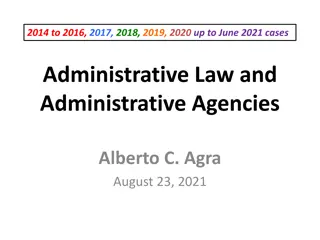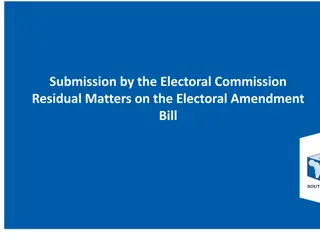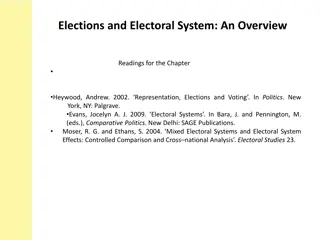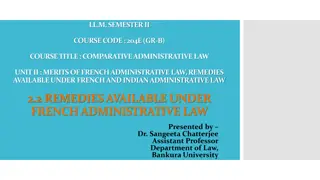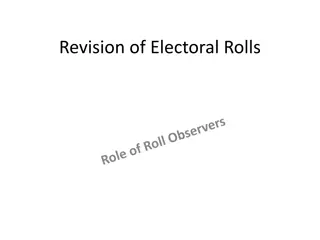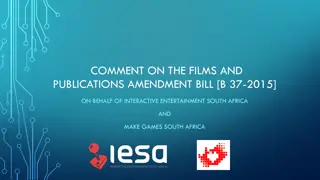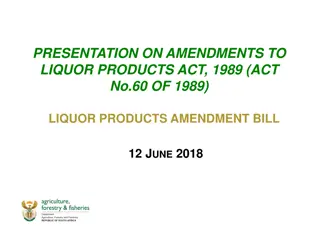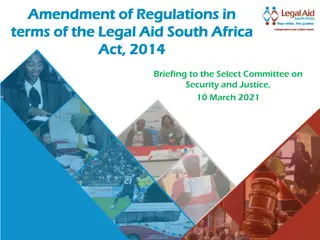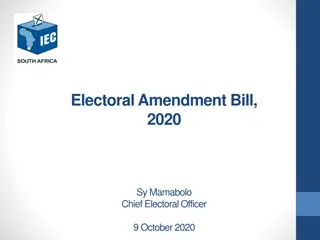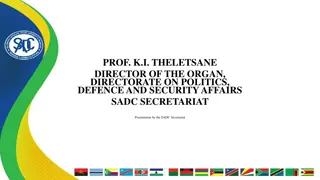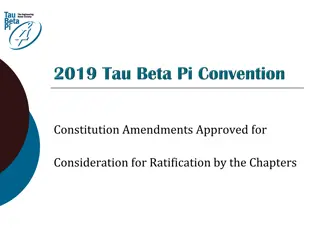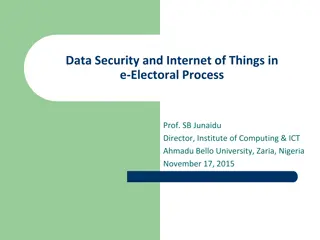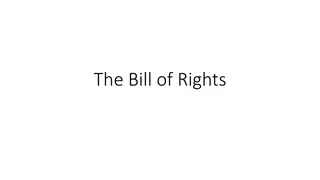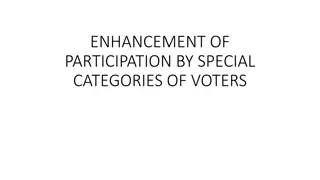Proposed Administrative Amendments to the Electoral Commission of South Africa
The Electoral Commission of South Africa is proposing administrative amendments to the Party Funding Act, including changes to definitions, establishment of the MPDF, investment of money in funds, management and administration of funds, allocation and payment of money to represented parties, and purposes for which money from funds may be used. These proposed amendments aim to enhance transparency and efficiency in the electoral process.
Download Presentation

Please find below an Image/Link to download the presentation.
The content on the website is provided AS IS for your information and personal use only. It may not be sold, licensed, or shared on other websites without obtaining consent from the author.If you encounter any issues during the download, it is possible that the publisher has removed the file from their server.
You are allowed to download the files provided on this website for personal or commercial use, subject to the condition that they are used lawfully. All files are the property of their respective owners.
The content on the website is provided AS IS for your information and personal use only. It may not be sold, licensed, or shared on other websites without obtaining consent from the author.
E N D
Presentation Transcript
ELECTORAL COMMISSION OF SOUTH AFRICA 1
Electoral Commissions Proposed Administrative Amendments to the Party Funding Act No. 6 of 2018 2
Section 1: Definitions The definition of the Chief Executive Officer (CEO) must be amended to read the Chief Electoral Officer appointed in terms of section 12(1) of the Electoral Commission Act"; All reference to the chief executive officer must be amended to chief electoral officer 3
Section 3: Establishment of the MPDF Insert a provision that provides the Commission with express permission to fund- raise for the MPDF. Insert a provision on where the forfeited funds (e.g., proceeds of crime) must be directed to. Whether to the National Revenue Fund, Criminal Assets Recovery Account, MPDF, etc. 4
Section 4: Investment of money in Funds Limitation to investment with the Public Investment Corporation (PIC) must be reviewed and be broadened to include short-term investments with any of the registered banks which may earn interest and in line with PFMA 5
Section 5: Management and administration of Funds Add a provision for forfeiture of funds after a prescribed period of non-compliance, for example, where over a period of two financial years that the party or Independent Representative has failed to submit audited financial statements. However, a forfeiture period need not apply in instances where there is a intra- party court process underway. 6
Section 6: Allocation and payment of money to represented parties Include a provision that s179 of the Tax Administration Act should not apply to monies from the RPPF and that there should be no Third Party collections to be served against the RPPF/the Commission in the context of this legislation. 7
Section 7: Purposes for which money from Funds may be used Insert a provision to prevent money from the funds being attached in the settlement of third party debts such as garnishee orders in favour of debtors. 8
Section 12: Purposes for which money from Funds may be used s12(2)(d)(i) - Change "statement" to "financial statements . s12(2)(d)(ii) Add that the Commission is empowered to prescribe the format of the statement 9
Section 14: Commissions monitoring and inspection powers s14(4) Amend to add a provision that says that the Commission and Electoral Court have powers to deal with appeals against decisions of the Chief Electoral Officer. 10
Section 16: Power to suspend payment of money Provide for the forfeiture of allocations of the Funds, where a party fails to submit financials for a prescribed period. 11
Section 21: Administration Delete section 21(2) as the chief electoral officer is now the accounting of the funds and the officer responsible for the implementation of the Act 12
Section 22: Report to Parliament Delete the words "together with the Commission s annual report in terms of section 14 of the Electoral Commission Act in s22(3) 13
Submission by the Electoral Commission on Consequential Amendments to the Electoral Amendment Act No. 1 of 2023 and the Electoral Commission Act No. 51 of 1996 14
Proposed Amendments to the Electoral Act 1.1 Impact of the two ballots for the National Assembly With the introduction of independent candidates, the Electoral Amendment Act provides for 2 ballot papers to be issued for the regional seats in the National Assembly and the compensatory seats in the National Assembly. In terms of the current provisions of the Electoral Act, as amended, the following categories of voters are qualified to be issued with the compensatory ballots for the National Assembly: voters who cast their ballot abroad; A voter who by way of section 24A of the Electoral Act who votes in a voting district 15 outside of the province of registration; and Voters who have applied for special votes outside of the province of their registration.
1.1 Impact of the two ballots for the National Assembly (Continued) The issue to be resolved: Are voters who are resident outside of the Republic, those that are voting abroad and those who are outside of their province of registration on voting day be entitled the ballot for the regional seats in the National Assembly? In order to conclusively respond to this issue, it is proposed that Sections 24A, 33(3) as well as section 33A of the Electoral Act be amended. The impact of such proposed amendments are as follows: A voter who casts a ballot at a voting district outside of the province of registration is not entitled to be issued with the ballot for the regional seats in the National Assembly. A voter who has applied for a special vote and is outside of the province of registration is not entitled to be issued with the ballot for the regional seats in the National Assembly. Similarly, a voter who is resident outside of the Republic and those voting abroad are not entitled to be issued with the ballot for the regional seats of the National Assembly. 16
1.2 Objections against candidates of political parties Currently section 30 of the Electoral Act makes no provision for objections to unrepresented political parties and independent candidates who fail to meet the signature quota requirements to contest elections. It is proposed that section 30 of the Electoral Act be amended to include section 30(1)(d) to enable objections to unrepresented parties and independent candidates that fail to satisfy the requirements in relation to signature quota requirements. 17
1.3 Amend clause 1 of the Electoral Act Amend section 1 to substitute the definition of serve to exclude obsolete means of communication (telegram, telex and telefax) and include e-mail as a mode for service. 18
Proposed Amendments to the Electoral Commission Act No. 73 of 1998 Amend section 1 of the Electoral Commission Act, to insert a definition of independent candidate by cross-referring to the definition in the Electoral Act. Amend section 1 by the substitution for the definition of politicaloffice of the following definition: politicaloffice means any executive appointment or elected office, including any elected or nominated public representative of a party, whether involving remuneration or not, or any other paid office, in the service of a party; and an independent candidate, whether involving remuneration or not; . Amend section 5(1)(g) by broadening the Commission s liaison and co-operation function 19 to include independent candidates and independent representatives
Proposed Amendments to the Electoral Commission Act No. 73 of 1998 Section 6 (2)(b) of the Electoral Commission Act must be amended by the substitution in subsection (2) for paragraph (b) of the following paragraph: (b) does not at that stage have a high [party-political] political profile; Section 6(2)(d) must be amended by the substitution in subsection (2) for paragraph (d) of the following paragraph: (d) has been nominated by a committee of the National Assembly, proportionally composed of members of all parties represented in the National Assembly, from a list of recommended candidates submitted to the committee by the panel referred to in 20 subsection (3): Provided that the National Assembly must establish Rules for the for the participation of independent representatives for this purpose.
Thank you 21
